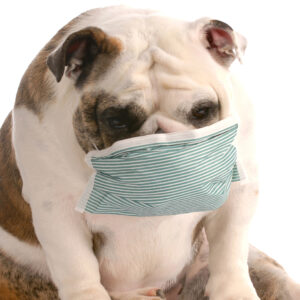CIRDC- Canine Infectious Respiratory Disease Complex
You may not have heard of it, but it’s been around for a long time. Canine Infectious Respiratory Disease Complex- or CIRDC. In March of 2022, it made headlines in the news, as a number of pets in South Florida were diagnosed with the disease. Miami-Dade Animal Services has issued an alert about several positive cases of the disease in the area, and has gone as far as restricting or suspending services at their facilities
First, we need to understand what CIRDC is. It is actually quite common- and is one of the most common respiratory diseases in dogs. It is highly contagious. It can be caused by a number of different pathogens, many of which you’ve probably heard of. Canine Parainfluenza Virus, Bordetella and Distemper are just a few. It is commonly referred to as ‘Kennel Cough’- which is a blanket term for most contagious respiratory diseases- and does not solely refer to Bordetella. A severe case of CIRDC can lead to pneumonia, sometimes severe- which could be fatal.

Should I be concerned here in Tampa if the outbreak is in South Florida?
The answer is maybe. If you take your pet to doggie day care or any type of kennel, or if you frequent dog parks you have reason for concern. Since COVID is now waning and people are beginning to travel more frequently, there’s the possibility that a pet could travel to our area with the disease and unknowingly spread it to others. The incubation period for the illness can be anywhere from 2 to 10 days, so an infected pet may appear healthy while still shedding virus.
If your pet is vaccinated against Distemper, Bordetella and Canine Influenza, the risk is relatively low. If they are exposed, they may have mild symptoms or none at all. Pets that are fully vaccinated and exposed also will reduce the shedding of the virus as well.
What to look out for:
Acute and sudden onset one or more of the following:
- Dry/‘honking’ cough
- Gagging or retching with expectoration of mucus
- Sneezing
- Nasal or ocular discharge
If you notice any of these signs that appear suddenly in your pet- and they’ve been exposed to unknown dogs outside of your home, contact your veterinarian. Let them know your pets symptoms. Your veterinarian will likely want to isolate them from other patients in their facility out of an abundance of caution.
Our recommendations
Ensure your pet’s vaccinations are up to date. If you’re unsure of your pet’s vaccination status, check with your veterinarian’s office. If your vet has an online patient portal, it usually has your pet’s vaccine history listed there- and is a quick way to find out.
If your pet is not up to date on their vaccines, we would suggest staying away from dog parks or other situations where your pet could be exposed to unknown pets until your pet is properly immunized against CIRDC pathogens.
